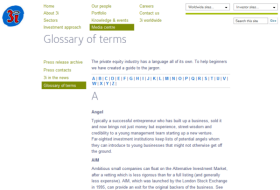Oddly, the Sunday Times ran two separate articles about corporate-speak this week, and though I would happily assign most examples of corporate-speak to the bin, I do want to defend some of it, and one word in particular.

The corporate-speak the ST was decrying falls into three main groups:
- Long-winded and pretentious phrasing, such as:
“High-quality learning environments are a necessary precondition for facilitation and enhancement of the ongoing learning process”
This example is highlighted by the Plain English website, and they translate it as:
“Children need good schools if they are to learn properly”.
It’s best to avoid this kind of writing: it is often intended to impress or to intimidate, and usually ends up with the reader suffering from bad brain fog.
- Management-speak clichés, such as ‘thinking outside the box’ or ‘singing from the same hymn sheet’. These are familiar to all of us by now, but they must have been fresh and surprising at some point.
Now they’re like Christmas cracker jokes, and just elicit a groan. New clichés, please…
- Jargon: language characteristic of a particular group or subject. Examples: ring game; toe-loop; pinking; deboss; and scuppers. (These are from poker, skating, sewing, printing, and sailing.)
And jargon is the type of corporate-speak I want to defend.
Technical term? Provide a glossary
All industries have their own technical terms. If you are deeply embedded in an industry, these terms don’t seem unusual at all, and each so precisely describes its subject that it would be absurd to use any other. Even though outsiders don’t have a clue what you mean. This is why we recommend using a glossary on the corporate website to explain any that might have crept in without being noticed.
And there is a clear need for using plain English wherever possible, at least if you’re trying to communicate with someone who is not within the industry, and therefore couldn’t be expected to know the technical terms.
This isn’t easy. One of the difficulties many website managers are dealing with is how to provide their information in an easily understandable form, appropriate for the audience they are aiming at.
Betting on the corporate website
Take, for example, our use of the word ‘stakeholder’. This word was vilified in both those articles in the Sunday Times this week.
The original meaning of the word was ‘someone entrusted to hold the stakes for people betting against one another, and required to hand the stakes to the winner’. This would have been someone trustworthy and independent, who probably didn’t have a stake in the bet.
Yet today it often means almost exactly the opposite: someone who does have an interest in ‘the bet’ – and probably a strong interest. In corporate terms, it describes people who are affected by, or who can affect, the actions of the business; those who have a stake in the success of the business. We use it to describe people with an interest in the corporate website. Examples include: investors, journalists, job-seekers, analysts, employees, suppliers …
This sometimes happens to words; the language changes constantly. (There’s a fascinating list of changes here, if you’re interested).
Does it matter? Does this change in meaning confuse people?
I don’t think it does, at least in this case. Using the words appropriate to the situation is important. In this case, using ‘stakeholder’ is a useful shortcut for ‘group of people with an interest in the business and therefore in the corporate website’ and will be understood by our primary audience. Avoiding using it will lead to repeatedly using long-winded phrasing; something to be avoided in itself.
What do you think? Is there ever a case for using jargon? Should all the language on a website be suitable for the averagely intelligent, averagely educated 14-year-old, or can some of it be more complex?
Is it even possible to remove all corporate jargon from the corporate website?
Lucy is Editor at Corporate Eye

I agree that sometimes complex language is necessary to communicate effectively with your audience, and as a result, industry jargon is usually appropriate for business-to-business web sites. If you’re not selling to 14-year-olds, don’t feel compelled to tailor your writing to them.
However, I think it’s important to draw a distinction between industry jargon and company jargon. (A third category, impenetrable corporate-speak, is never appropriate in my opinion.) Many companies have terms for internal business processes and systems. These make sense to employees but should never be used on the web site, in sales presentations or in recruiting. You have to understand your audience and write using language they understand.
For example, I once worked for a company that posted an job ad looking for candidates to operate its Bandit system, which was an internal term for a proprietary order entry system. A certain amount of jargon is necessary to describe what technical qualifications was required, but I’m sure they would have been more successful if they had used more common industry terms to describe the job. (And what genius came up with the name Bandit for an order entry system?)
I think the root of the problem is that many people do not stop to think that their audience may not understand their everyday jargon. It’s our job as communicators to be mindful of both the message and audience.
You’re quite right – we shouldn’t use internal language on an externally facing site. (I’m tickled by the idea of an order entry system called Bandit …). I particularly like your point about using internal terminology on external job ads.
Presumably this extends to job titles, too. What do you think about the former(?) trend for dotty job titles in startups – Evangelist, Chief Geek, Ninja, Chief Happiness Officer – more here? These always make me smile, and often click through to find out more, but I wonder how these play in the offline world. Not sure that a Fortune 500 would have a Chief Geek as their CTO…